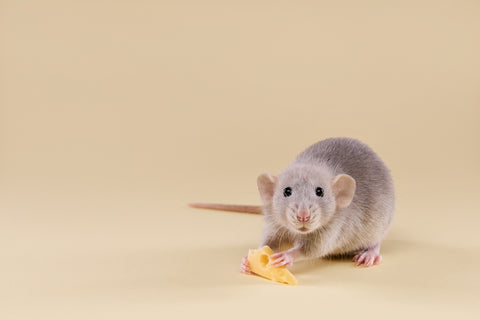Mice are problematic pests for many reasons. They spread disease, gnaw at furniture, and contaminate food.
But do mice bite?
They sure do. And it can have nasty consequences for the victim.
This guide will look into why mice bite and some of the dangers associated with a mouse bite.
The Reasons Why Mice Bite
When it comes to the question of “Do mice bite?” the answer is a clear and definitive “Yes.”
But in regard to why they bite, there are many possible explanations. Here are just some of the reasons why a mouse might bite.
Defending Themselves
Mice are small and delicate creatures, and they’re often targeted by larger predators.
As such, they need some way to defend themselves, and the only real weapon they have is their teeth. So, when feeling cornered or threatened, mice may bite to survive.
Exploring Their Surroundings
Mice have pretty poor eyesight, relying on their other senses to explore the world and identify food or threats. They may nibble and gnaw at things as a way of finding out more about them. This can include any human fingers or toes that happen to cross a mouse’s path.
Protecting Their Territory or Babies
Mice can also be quite territorial, especially when they’ve found a good place to live with shelter and access to food.
They might bite other mice or anything else they feel is moving in on their turf. If they happen to have babies, mice will also bite to defend their nest.
Feeling Stressed or Agitated
Like countless other animals, mice may also respond with aggression when they’re feeling stressed out, agitated, or angered.
If they’re in a hectic, confusing, or scary situation, even tame pet mice can bite their owners unexpectedly.
Asserting Themselves or Communicating With Other Mice
This isn’t something for humans to worry about, but mice will also bite each other in certain situations.
They might bite as a form of asserting their dominance, for example, or to communicate with other mice in their group.

The Risks and Dangers of Mouse Bites
As already established, mice do bite, and they can have quite a few reasons for doing so.
But are mouse bites dangerous? Can they cause infections and illnesses? Well, the unfortunate answer, once again, is yes.
While they might not be as nasty as bites from bigger creatures, mouse bites can still cause quite a few problems for the unhappy target.
Spreading Disease
Arguably the worst aspect of a mouse bite is the risk of it leading to some sort of infection.
Mice can carry all sorts of viruses, bacteria, and even parasites. And when their bites break the skin, they can pass those germs into the body.
Some of the worst examples include:
- Hantavirus: Hantavirus is a virus that may cause a condition called Hantavirus Pulmonary Syndrome, or HPS. HPS is a potentially serious respiratory condition, with symptoms including shortness of breath and coughing.
- Rat-Bite Fever: Despite the name, this bacterial infection can also come from mouse bites. It may lead to a series of symptoms, from fevers and high temperatures to muscle and joint soreness.
- Lymphocytic Choriomeningitis: Lymphocytic choriomeningitis is another possible infection from mouse bites. Estimates suggest that around 5% of all house mice carry this particular virus. It can cause a fever, headaches, vomiting, and may even develop into meningitis.
Risk of Other Infections
When mice bite, they can leave a weakness or small wound in the skin for germs to enter.
Even if you avoid the usual mouse-related infections, your bite could still allow other viruses and bacteria to infiltrate and cause symptoms like redness, swelling, and pain.
Allergic Reactions
There’s also a risk of allergic reactions to mouse bites. Some people may respond badly when exposed to certain proteins within mouse saliva, for example, and that could cause swelling and inflammation of the affected area.
The Mental Toll
There’s also a mental health toll associated with mouse bites. They may only seem like small injuries, but they can traumatize people in various ways.
Victims might be scared about being bitten again and frightened of their own homes or too stressed to sleep, for instance.
Pain
Do mice bites hurt? They certainly do. It all depends on your own pain tolerance levels, but a mouse bite is generally described as a sharp pinch.
Mice have pretty sharp teeth and may draw blood, leaving a little puncture mark behind after they bite.

Preventing and Dealing With Mouse Bites
The best way to prevent mouse bites is to keep mice at bay with mouse repellent products, like mouse repellent spray or pouches.
And if you do spot any mice in the home or signs of mice, take action right away – use mouse deterrent solutions to get rid of them.
As for what to do if a mouse bites you, the best course of action is to clean the area, then dry it and apply antiseptic cream or ointment.
You can finish up by putting a bandage around the wound and giving it time to heal.
It’s also recommended to see a doctor, even if you feel fine, just in case a virus or bacteria has entered your body – doctors can prescribe antibiotics to treat infections before they become serious.
Keep Mice Away With the Best Mouse Repellent
Overall, mice bites can be pretty nasty. It’s not just the initial sting, but also the risk of infection, which can lead to some serious symptoms and consequences. In short, it’s something that you’ll want to avoid.
To reduce the chances of suffering from a mouse bite, the best option is to use mouse repellent and mouse deterrent products.
Possible mice control products to use include mouse repellent spray or mouse repellent bags.


